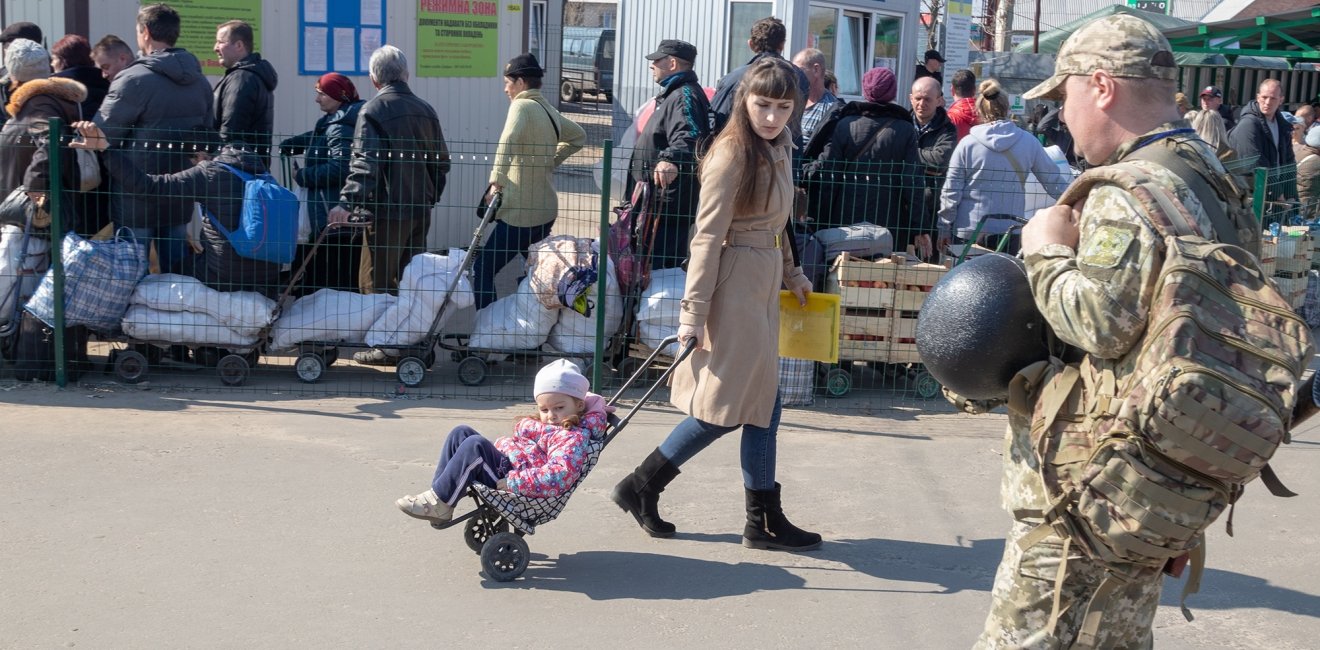
A blog of the Kennan Institute
BY VITALIY SYZOV
The COVID-19 pandemic might offer Ukraine an unexpected chance to restart the peace negotiations with Russia from a position of strength. The help Kyiv and the West are quietly providing to the non-controlled territories in Ukraine’s East in handling the pandemic and associated humanitarian crisis could be key to moving forward on other fronts. Both push factors and pull factors are at work in subtly changing the political landscape.
First, the situation on the ground: while Russia’s caseload is spiking, Ukraine’s rate of new cases is stabilizing within the broad parameters of 400 to 700 per day. The government of Ukraine is engaged in a slow easing of quarantine measures, with cultural institutions opening June 10 as part of phase 3 of the reopening plan. A few oblasts—Volyn, Donetsk, Lviv, Rivne, and Chernivtsi—remain in phase 1. The non-controlled territories, lacking resources, have in general been worse affected by COVID-19 than “mainland” Ukraine. The competition for influence in these territories is now tilting toward Kyiv as a result. Kyiv should not lose this moment of opportunity.
Local authorities—Russia’s proxies—in the self-styled Luhansk People’s Republic (LPR) and Donetsk People’s Republic (DPR) can no longer rely as firmly on Russian backing as they once did. In addition to the toll from COVID-19 in Russia, which has seen many medical professionals infected and students recruited out of medical school to provide treatment, Moscow’s economic contribution to maintaining the non-controlled territories is at risk. Russia itself is in an economic recession and unlikely to be able to direct extra funding to support local communities in the DPR and LPR. That leaves Ukrainian pensioners, who make up the largest part of the local population, to push money into the system. Because civilian movement across the front lines was halted as part of the quarantine measures, they are unable to access a functioning banking system and so are obliged to use the local shadow banking system, which charges a high fee—if they choose to cash the checks at all. This twofold hit, the lack of Ukrainian pension payments entering the local economy and Russia’s limited ability to help, has worsened the humanitarian situation in the Donbas.
These push factors have led local authorities to quietly accept help from the International Red Cross. In April, humanitarian aid was transported from the government-controlled part of Ukraine by plane to the non-controlled territories, with further transport to Donetsk carried out by the Red Cross. Of course, the local authorities in the LPR and DPR could not reveal to the residents that they had received help from the Ukrainian authorities, which would fly in the face of Russia’s propaganda efforts.
This impressive pull factor seems to have been accompanied by a muting of the local authorities’ criticism of Western health care systems and governments, which had ramped up shortly after the beginning of the pandemic.
With anti-Kyiv and anti-Western sentiment briefly quieted, Kyiv has a significant window of opportunity to pursue the peaceful reintegration of the non-controlled territories. The results of a recent survey show that the vast majority of Ukrainians support the idea of treating people from the LPR and DPR who contracted COVID-19 infection in mainland Ukraine. This could be the issue that undermines Russian influence in the Donbas adequately to permit peace negotiations more favorable to Ukraine than to Russia. Compared to Russia, Kyiv has few instruments in its quiver to fight for the sympathies of Ukrainians living in the non-controlled territories.
Despite the difficult economic situation and the lack of freedom in the uncontrolled Donbas, Russia is still attractive to certain segments of the local populations, an effect conditioned by Russia’s strong control of the media and public sphere. Russia offers its potential citizens some support and the pledge of effective public institutions in the DPR and LPR; until recently it offered financial stability. Kyiv’s recent actions and gestures of support toward the people living in the non-controlled territories could, however, turn the tide of sentiment in Kyiv’s favor. It will be up to Kyiv to muscle the political will, confidence, and unity to move forward in uniting Ukraine before the window of opportunity closes.
The opinions expressed in this article are those solely of the author and do not reflect the views of the Kennan Institute.
Author


Kennan Institute
The Kennan Institute is the premier US center for advanced research on Eurasia and the oldest and largest regional program at the Woodrow Wilson International Center for Scholars. The Kennan Institute is committed to improving American understanding of Russia, Ukraine, Central Asia, the South Caucasus, and the surrounding region through research and exchange. Read more

Explore More in Focus Ukraine
Browse Focus Ukraine
Talking to the Dead to Heal the Living

Ukrainian Issue in Polish Elections


